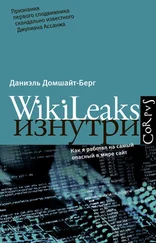Harding, Luke - WikiLeaks - Inside Julian Assange's War on Secrecy
Здесь есть возможность читать онлайн «Harding, Luke - WikiLeaks - Inside Julian Assange's War on Secrecy» весь текст электронной книги совершенно бесплатно (целиком полную версию без сокращений). В некоторых случаях можно слушать аудио, скачать через торрент в формате fb2 и присутствует краткое содержание. Жанр: Старинная литература, на английском языке. Описание произведения, (предисловие) а так же отзывы посетителей доступны на портале библиотеки ЛибКат.
- Название:WikiLeaks: Inside Julian Assange's War on Secrecy
- Автор:
- Жанр:
- Год:неизвестен
- ISBN:нет данных
- Рейтинг книги:3 / 5. Голосов: 1
-
Избранное:Добавить в избранное
- Отзывы:
-
Ваша оценка:
- 60
- 1
- 2
- 3
- 4
- 5
WikiLeaks: Inside Julian Assange's War on Secrecy: краткое содержание, описание и аннотация
Предлагаем к чтению аннотацию, описание, краткое содержание или предисловие (зависит от того, что написал сам автор книги «WikiLeaks: Inside Julian Assange's War on Secrecy»). Если вы не нашли необходимую информацию о книге — напишите в комментариях, мы постараемся отыскать её.
WikiLeaks: Inside Julian Assange's War on Secrecy — читать онлайн бесплатно полную книгу (весь текст) целиком
Ниже представлен текст книги, разбитый по страницам. Система сохранения места последней прочитанной страницы, позволяет с удобством читать онлайн бесплатно книгу «WikiLeaks: Inside Julian Assange's War on Secrecy», без необходимости каждый раз заново искать на чём Вы остановились. Поставьте закладку, и сможете в любой момент перейти на страницу, на которой закончили чтение.
Интервал:
Закладка:
The editor had vivid memories of sitting in the Oval Office as President George W Bush tried to persuade him and the New York Times ’s publisher to withhold the eavesdropping article. Bush told him that if the paper published, it should share the blame for the next terrorist attack. Unconvinced, the paper published anyway, and the reaction from the government and conservative commentators in particular was vociferous.
This time around, the US administration reaction was different. It was, for the most part, sober and professional. The Obama White House, while strongly condemning WikiLeaks for making the documents public, did not seek an injunction to halt publication. There was no Oval Office lecture, no plea to Keller or the publisher not to write about the documents. “On the contrary, in our discussions before the publication of our articles, White House officials, while challenging some of the conclusions we drew from the material, thanked us for handling the documents with care. The secretaries of state and defence and the attorney general resisted the opportunity for a crowd-pleasing orgy of press-bashing,” Keller says, adding: “Though the release of these documents was certainly painfully embarrassing, the relevant government agencies actually engaged with us in an attempt to prevent the release of material genuinely damaging to innocent individuals or the national interest.”
From his secret hideout back in Ellingham Hall, Assange sought to open his own channel of negotiations, sending a letter on 26 November to the US embassy in London. Headed “Julian Assange, editor-in-chief, WikiLeaks”, it began: “Dear Ambassador Susman, I refer to recent public statements by United States government officials expressing concern about the possible publication by WikiLeaks and other media organisations of information allegedly derived from United States government records.”
Assange invited the US government to “privately nominate” examples where publication of a cable could put an individual “at significant risk of harm”. He promised WikiLeaks would quickly consider any US government submissions ahead of publication. The state department’s legal adviser Harold Koh sent an uncompromising letter back. It stated that the cables “were provided in violation of US law and without regard for the grave consequences of this action”.
Releasing them “would place at risk the lives of countless individuals”, jeopardise ongoing military operations, and threaten co-operation between the US and its allies and partners, the letter said. It would hinder co-operation on “common challenges such as terrorism, pandemic diseases and nuclear proliferation”.
The letter ordered WikiLeaks to halt plans to publish the cables, hand back the stolen files, and “destroy all records of this material from WikiLeaks’ databases.”
Assange wrote to Susman again on 28 November. He made clear that WikiLeaks had no intention of putting anybody at risk, “nor do we wish to harm the national security of the United States”. He continued: “I understand that the United States government would prefer not to have the information that will be published in the public domain and is not in favour of openness. That said, either there is a risk or there is not. You have chosen to respond in a manner which leads me to conclude that the risks are entirely fanciful and that you are instead concerned only to suppress evidence of human rights abuses and other criminal behaviour.”
The negotiations with the state department – such as they were – thus terminated. All that was left was to prepare for simultaneous publication of the biggest leak in the history. What could possibly go wrong?
CHAPTER 15
Publication day
Basel railway station, Switzerland
28 November 2010
“ Launch! Launch! Launch! ”
G UARDIAN NEWSROOM
It was Sunday morning at the sleepy Badischer Bahnhof. Few were around. The station sits precisely on the border between Germany and Switzerland. It is a textbook example of European co-operation – with the Germans providing the trains, and the Swiss running the cafés and newspaper kiosks. This morning, however, the station would become briefly notorious for something else: a gigantic foul-up.
Early in the morning, a van rolled in, bearing 40 copies of the German news magazine Der Spiegel . The weekly normally starts distributing copies to newsagents over the weekend, with revellers in Berlin able to buy it late on Saturday night on their way home. But on this occasion – as with the publication of the Afghan war logs – Der Spiegel was supposed to have held all copies of its edition back. The international release of the US embassy cables had been painstakingly co-ordinated for 21.30 GMT that Sunday evening. The Guardian , New York Times , El País and Le Monde were all waiting anxiously to push the button on the world’s biggest leak. Der Spiegel had agreed to roll its stories out at the same time on its website, with the magazine only published on the following Monday morning. Everyone knew the script.
But the gods of news had decided to do things differently. At around 11.30am Christian Heeb, the editor-in-chief of the local Radio Basel, discovered a copy of Der Spiegel at the station. It was dated 29/11/10. It cost €3.80. The front cover was nothing less than sensational: “Revealed: How America Sees the world”. The strap-line confirmed: “The secret dispatches of the US foreign ministry”. Against a red background was a photo-gallery of world leaders, each accompanied by a demeaning quotation culled from the US cables. Angela Merkel, Germany’s increasingly un popular chancellor, was “risk averse and rarely creative”. Guido Westerwelle, Merkel’s disastrous foreign minister, was “aggressive”. Then there were the others. Vladimir Putin? “Alpha dog”. Dmitry Medvedev? “Pale and hesitant”. Silvio Berlusconi? “Wild parties”. Mahmoud Ahmadinejad? “Hitler”. Next to Libya’s Muammar Gaddafi were the tantalising words “Luxuriant blonde nurse”. More extraordinary revelations were promised inside.
Heeb’s station started to broadcast the news, saying a few early copies of Der Spiegel had become available at Basel station. It was at this point that an anonymous Twitter user called Freelancer_09 decided to check out the prospect for himself. He tweeted: “ Der Spiegel zu früh am Badischen Bahnhof Basel! Mal schaun was da steht.” ( Der Spiegel too early at Basel station! Let’s see what’s there.) Freelancer_09 managed to obtain one of the last two or three copies of the rogue Spiegel batch, just as panicked executives at the magazine’s Berlin headquarters were realising something had gone horribly wrong: one of the distribution vans sent to crisscross Germany had set off for Switzerland 24 hours too early.
Radio Basel in Switzerland received a hasty phone call from Germany. Would they come off the air in return for subsequent help with the story? But it was too late. Freelancer_09 was already at work: within minutes he had begun tweeting the magazine’s contents. Merkel had a better relationship with US president George W Bush than with his successor Barack Obama! US diplomats have a low opinion of Germany’s regional politicians! The Americans think Westerwelle is a jerk! At the start of the morning Freelancer_09 had a meagre tally of 40 Twitter followers. His own political views seemed pretty clear – alternative, counter-cultural, even anarchist – judging from the leftist Twitter users he followed, and from his own profile photo: a child shouting through a loud-hailer above the words: “Police state”. Who he was exactly was uncertain. (His identity remained mysterious; some weeks later his Twitter account went dormant.)
Читать дальшеИнтервал:
Закладка:
Похожие книги на «WikiLeaks: Inside Julian Assange's War on Secrecy»
Представляем Вашему вниманию похожие книги на «WikiLeaks: Inside Julian Assange's War on Secrecy» списком для выбора. Мы отобрали схожую по названию и смыслу литературу в надежде предоставить читателям больше вариантов отыскать новые, интересные, ещё непрочитанные произведения.
Обсуждение, отзывы о книге «WikiLeaks: Inside Julian Assange's War on Secrecy» и просто собственные мнения читателей. Оставьте ваши комментарии, напишите, что Вы думаете о произведении, его смысле или главных героях. Укажите что конкретно понравилось, а что нет, и почему Вы так считаете.












